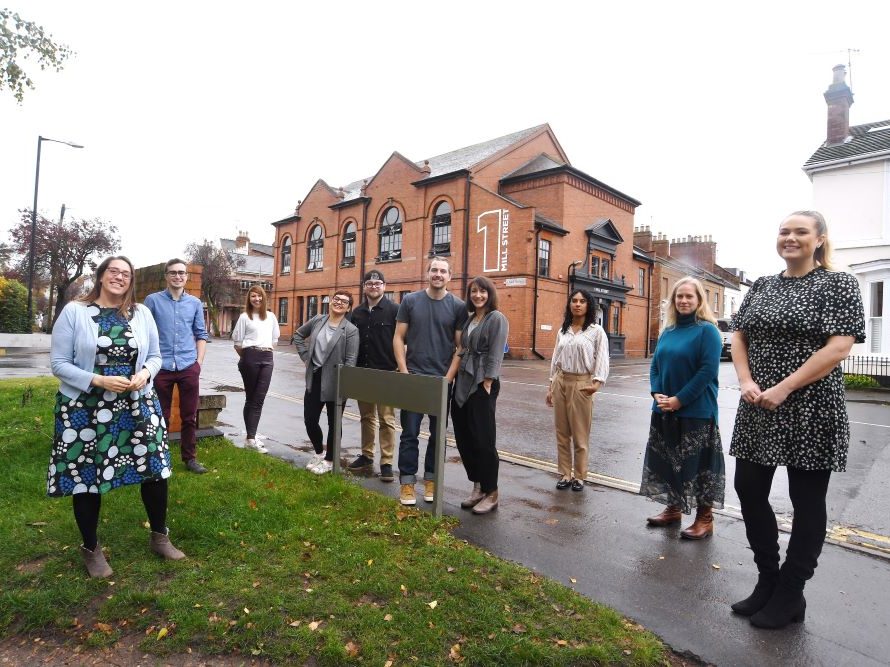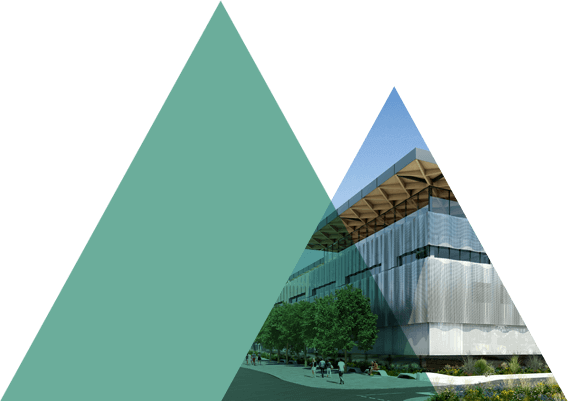Creative future for 10 new businesses & 500 innovators at Leamington Spa’s 1 Mill Street

Ten new businesses will be the first to benefit from a new Creative Futures Accelerator Programme in Leamington Spa’s Creative District that will help those businesses become part of the UK’s largest creative cluster outside Greater London. The project, which will also work with 500 innovators, will help business teams develop their entrepreneurial skills, test, launch, and pitch their business ideas, and get 6 months of free space and support to develop their creative enterprises in 1 Mill Street in Leamington Spa.
The scheme is supported by the University of Warwick, 1 Mill Street , BT and Warwickshire County Council. They will work together to hone the next generation of regional entrepreneurs and innovators as part of the University of Warwick’s Creative Futures Incubator initiative, which is helping to educate and incubate start-up businesses in a bid to support the largest creative cluster outside of Greater London.
Over the next 12 months initially ten new businesses, selected by the University of Warwick, will have access to state-of-the-art offices, meeting spaces and collaboration networks at 1 Mill Street, which is based on the corner of Mill Street and Leam Terrace.
As part of the partnership, each business in the Creative Futures Incubator will be given six months of free access to 1 Mill Street in order to work with the University to develop their business. This will include weekly coaching sessions, access to enterprise experts and mentors and the ability to network and learn from other businesses in the Incubator and Mill Street members.
Each start-up will be able to benefit from the transformation of the 12,000 sq ft Victorian building into a modern creative enterprise hub, incorporating flexible offices, dedicated desks and hot-desking, a video and sound studio, The Muse Coffeehouse, meeting areas and a world-class events space. The businesses in the Creative Futures Incubator will now also have access to the UK’s number one 5G network, from BT Group, offering ultra-fast speeds, lower latency and enhanced reliability. BT recently switched on its 5G network on the University campus and surrounding areas, as part of the innovation alliance between BT, University of Warwick and Warwickshire County Council to accelerate innovation and economic growth for local businesses.
Those moving into the new community hub include brand and digital content agency – Blunt & Brave, content creation company – Common Story, arts and creative production company – Creative Leamington, sustainable eyewear manufacturer – Icycle, and a community-driven a cappella organisation called Open A cappella. Other standalone businesses, already based at 1 Mill Street, are being offered access to the University of Warwick’s business support and careers advice expertise.
Dom Sant and Beth Newell from Common Story say:
“After decades of working in London for TV production companies, the national lockdown made us re-evaluate how and where we work. We saw great opportunity in the creative and screen industries in the Midlands, particularly in Silicon Spa, so decided to establish Common Story as a content creation start-up. Before being selected into the Creative Futures Incubator, we were working out of a tiny shed at the bottom of the garden. This opportunity has enabled us to be more productive, network and make new connections and potential collaborations with members of the wider Mill Street community, as well as given us space to pitch to major broadcasters and platforms such as Channel 4 and YouTube.”
Working in partnership with the Coventry & Warwickshire Local Enterprise Partnership, BT and Warwickshire County Council, Creative Futures will inspire, stimulate and connect over 500 potential innovators in the Creative & Digital sector. Over the next two years, we will create five transformational education programmes that will ensure Warwick students can graduate with skill-sets that will accelerate innovation in the sector; as well as introduce a dynamic, multi-faceted business engagement programme leveraging the University’s commitment to teaching, learning and research.
Rachel Davis, Director of Warwick Enterprise at the University of Warwick, said:
“1 Mill Street offers a glimpse into the collaborative nature of the future working world, and the time these micro-businesses spend here will no doubt serve as a launchpad for them to grow their organisations further.”
“Starting a business is challenging and practical experience is vital in the early stages, so learning from other businesses – which they will be doing on a near daily basis at 1 Mill Street – combined with guidance and mentoring from University staff will stand these entrepreneurs in good stead for the future.”
“This is also the first time that the University of Warwick will have had a physical presence in the heart of Leamington, and we are really excited to be involved in developing a community at 1 Mill Street. This new presence is a fantastic addition to the Warwick Innovation District, a large, open innovation ecosystem, powered by the University of Warwick; the District enables collaboration, networking, innovation and business growth to occur with a physical footprint stretching from the University Hospital Coventry & Warwickshire, through Leamington to Wellesbourne.”
Nigel Shanahan, founder of 1 Mill Street, added:
“This partnership with the University of Warwick helps to build upon the broad variety of organisations that we have operating out of the complex – not just in terms of their sectors, but also the varying stages of development that they are at.”
“We are creating a hub where organisations can develop by supporting each other – an approach that is needed now more than ever given the wider economic climate.”
“The interest that we have had in 1 Mill Street so far has been phenomenal, and underlines just what an exciting project we are building here for Leamington and the wider region.”
Note for editors
- For more information about 1 Mill Street visit 1millstreet.com
- For more information about Creative Futures visit https://warwick.ac.uk/fac/cross_fac/enterprise/creativeanddigital/
- For more information about the Warwick Innovation District visit https://warwickinnovationdistrict.com/
Some of the first businesses to benefit will be:
- Blunt & Brave – a brand and digital content agency – https://www.bluntandbrave.com/
Video at: https://www.youtube.com/embed/CtAg6Y0TgX4 - Common Story – a content creation company – https://www.commonstory.tv/team
Video at: https://www.youtube.com/embed/T2HKkqx-BiQ - Creative Leamington – Arts and creative production company – https://www.creativeleamington.co.uk/
Video at: https://www.youtube.com/embed/RPBnTZieTWQ - Icycle– Sustainable eyewear manufacturer – http://www.icycle.xyz/
Video at: https://www.youtube.com/embed/R23woncSenE - Open A cappella – community-driven a cappella organisation
video at: https://www.youtube.com/embed/9FUdbu0LATg
For further information please contact:
Peter Dunn, Director of Press and Media Relations, University of Warwick: p.j.dunn@warwick.ac.uk

